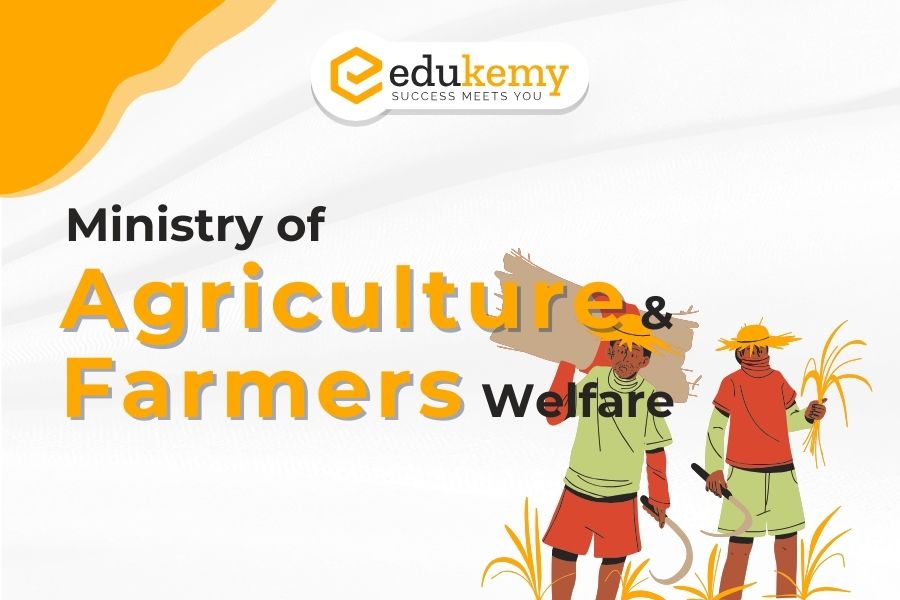
The Ministry of Agriculture & Farmers’ Welfare is the driving force behind India’s agricultural sector, dedicated to ensuring food security, farmer prosperity, and rural development. With a focus on modernizing agriculture, enhancing productivity, and promoting sustainable practices, it implements policies and initiatives to support farmers at every stage of the agricultural value chain. Stay informed about government schemes, subsidies, and agricultural technologies provided by the Ministry of Agriculture & Farmers’ Welfare. Explore resources for crop diversification, soil health management, and water conservation to improve farm yields and resilience. Whether you’re a farmer, agri-entrepreneur, researcher, or policymaker, let’s work together to cultivate a brighter future for Indian agriculture, fostering prosperity and sustainability for generations to come.
Contents
- 1 Market Intervention Scheme (MIS)
- 2 FAQs
- 2.1 Q. What is the role of the Ministry of Agriculture & Farmers Welfare?
- 2.2 Q. What are the key objectives of the Ministry of Agriculture & Farmers Welfare?
- 2.3 Q. What initiatives has the Ministry of Agriculture & Farmers Welfare undertaken to promote agricultural development and sustainability?
- 2.4 Q. How does the Ministry of Agriculture & Farmers Welfare support farmers’ welfare and income enhancement?
- 2.5 Q. What role does the Ministry of Agriculture & Farmers Welfare play in ensuring food security and nutrition?
- 3 In case you still have your doubts, contact us on 9811333901.
Market Intervention Scheme (MIS)
- The Market Intervention Scheme (MIS) is a government initiative designed for the procurement of perishable agricultural and horticultural commodities that are not covered under the Price Support Scheme (PSS). Here are the key features of MIS:
- Objective: The primary objective of MIS is to safeguard the interests of growers of perishable commodities. It aims to prevent them from selling their produce at distressingly low prices during periods of abundant harvest when market prices tend to drop below economically sustainable levels and the cost of production.
- Eligibility Criteria: For a commodity to be eligible under MIS, there should be either a minimum 10 per cent increase in production or a 10 per cent decrease in the prevailing market prices compared to the previous normal year.
- Request and Cost Sharing: The scheme is implemented at the request of a State or Union Territory (UT) government. The requesting government agrees to bear 50 per cent of any losses incurred during the scheme’s implementation (25 per cent in the case of North-Eastern States).
- Procurement Process: The designated agencies appointed by the State Government, in adherence to MIS guidelines, procure a pre-determined quantity of the commodity at a fixed Market Intervention Price (MIP). This process continues for a specified duration or until market prices stabilize above the MIP, whichever comes first.
- Central Share of Losses: In case of any losses incurred in implementing MIS, the Central Government contributes a share of the losses. This is done based on specific proposals received from the State Governments.
- In essence, the Market Intervention Scheme acts as a safety net for growers of perishable commodities, protecting them from financial losses during periods of market surplus. It relies on a coordinated effort between the Central and State/UT governments to ensure the effective implementation of the scheme.
FAQs
Q. What is the role of the Ministry of Agriculture & Farmers Welfare?
The Ministry of Agriculture & Farmers Welfare is responsible for formulating and implementing policies, programs, and initiatives aimed at promoting agricultural development, ensuring food security, and improving the welfare of farmers in India. It focuses on enhancing agricultural productivity, sustainability, and profitability while addressing the diverse needs and challenges of farmers.
Q. What are the key objectives of the Ministry of Agriculture & Farmers Welfare?
The Ministry aims to promote sustainable and inclusive agricultural growth, enhance farmers’ incomes and livelihoods, ensure food security and nutrition, and strengthen rural economies. Its objectives include modernizing agriculture, promoting technology adoption, improving access to inputs, markets, and credit, and providing social protection and support to farmers.
Q. What initiatives has the Ministry of Agriculture & Farmers Welfare undertaken to promote agricultural development and sustainability?
The Ministry implements various initiatives and schemes to promote agricultural development and sustainability, including Pradhan Mantri Krishi Sinchayee Yojana (PMKSY) for irrigation, Paramparagat Krishi Vikas Yojana (PKVY) for organic farming, and Soil Health Card Scheme for soil fertility management. It also promotes crop diversification, water conservation, and climate-resilient agriculture practices to enhance productivity and resilience in agriculture.
Q. How does the Ministry of Agriculture & Farmers Welfare support farmers’ welfare and income enhancement?
The Ministry supports farmers’ welfare and income enhancement through various measures, including minimum support price (MSP) for agricultural commodities, crop insurance schemes, interest subsidy on agricultural loans, and direct income support schemes such as Pradhan Mantri Kisan Samman Nidhi (PM-Kisan). It also provides extension services, training, and capacity-building programs to empower farmers with knowledge and skills for sustainable agriculture.
Q. What role does the Ministry of Agriculture & Farmers Welfare play in ensuring food security and nutrition?
The Ministry of Agriculture & Farmers Welfare plays a critical role in ensuring food security and nutrition by promoting agricultural productivity, diversification, and market access for nutritious foods. It supports initiatives such as National Food Security Mission (NFSM), Rashtriya Krishi Vikas Yojana (RKVY), and Mid-Day Meal Scheme to enhance food production, distribution, and accessibility for vulnerable populations, particularly in rural areas. Additionally, it promotes nutrition-sensitive agriculture and food-based interventions to address malnutrition and improve dietary diversity.
In case you still have your doubts, contact us on 9811333901.
For UPSC Prelims Resources, Click here
For Daily Updates and Study Material:
Join our Telegram Channel – Edukemy for IAS
- 1. Learn through Videos – here
- 2. Be Exam Ready by Practicing Daily MCQs – here
- 3. Daily Newsletter – Get all your Current Affairs Covered – here
- 4. Mains Answer Writing Practice – here

